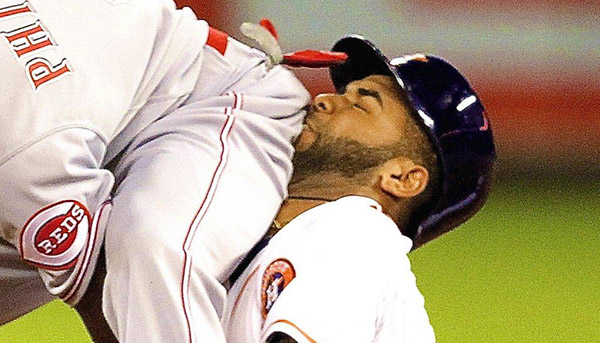Why Did Jacob deGrom Win the Cy Young Award?
 Did Jacob deGrom deserve to win the National League Cy Young Award this past season? The dispute is so perfectly baseball. Why? Because baseball has yet to fully reflect the diminished importance of certain time-honed statistics like the pitching victory.
Did Jacob deGrom deserve to win the National League Cy Young Award this past season? The dispute is so perfectly baseball. Why? Because baseball has yet to fully reflect the diminished importance of certain time-honed statistics like the pitching victory.
The simple truth is pitchers spend less and less time on the mound. Yanked in and out of games by managers wielding numbers around in their heads, pitchers have become somewhat nomadic. Never sure where they’ll be next—the clubhouse, the dugout, or the bullpen. Either way it’s a journey to find the pitching victory.
This is why some are tarnishing the Cy Young Award earned by Jacob deGrom this past season. Because his record was only 10-9—barely above .500. Other’s argue that despite his won-loss record deGrom was still the best pitcher in the National League and his numbers prove it. But there are skeptics.
Pitching for the Mets, deGrom had a 1.70 ERA in his 32 starts over 217 innings. He averaged slightly less than seven innings a start. This means he was seven or perhaps six outs better than the average five-inning pitcher. Or to use a numerical equivalent, deGrom was nearly 40 percent better than the average starter in the majors this past season. He was on the mound quite a bit.
While WAR is not exactly equivalent for pitchers as for hitters, deGrom’s WAR this past season was a healthy 8.8. His Adjusted ERA+ was 45 and his Adjusted FIP+ was 49 (where 100 is league average for both)—excellent numbers. So, the analytics confirm that deGrom was the premier pitcher in the National League in 2018 regardless of how many pitcher victories he accumulated.
This season deGrom had 18 starts allowing one run or fewer. The Mets didn’t win a lot of deGrom’s starts mostly because he had the second-worst run support in the league. If deGrom had managed to stay in games just a little bit longer, maybe he would have more wins.
So, who should record the pitching victory if not the starter? Awarding wins to relief pitchers was always arbitrary and ho-hum. But there have been exceptions.
Great Relief Pitching Performances over the Years
Think of three men, different eras. Firpo Marberry, Jim Konstanty and Sparky Lyle.
Firpo Marberry was the 24-year-old rookie pitcher of the Washington Senators who was the weapon extraordinaire that along with the “Big Train” Walter Johnson led Washington to their one and only World Series victory in 1923. While Marberry only appeared in 11 games after joining the Senators, he started four games, completed two and finished five games over the 44 innings he threw during the regular season.
By all newspaper accounts of the time, Marberry was the difference maker who helped make Walter Johnson even better in 1923. And Marberry was 4-0 in this brief season.
Or consider Jim Konstanty of the World Series winning “Whiz-Kid” Phillies in 1950, who threw a scintillating 150 innings during his 74 relief appearances that season—what the five-inning pitcher throws today. This led to a 16-7 relief record and a 2.66 ERA in what was a high-scoring season. All in all, a remarkable National League MVP-winning season for Konstanty.
That the Phillies lost in four straight to the Yankees in the World Series is beside the point. Without Konstanty, the Phillies would never have made the Series.
Then more recently during the 1977 season Sparky Lyle won the Cy Young Award when he made 72 relief appearances over 137 innings with a 2.17 ERA. That’s about two innings an appearance. And he was superb. A big reason the Yankees not only won the Eastern Division, but made it to the World Series against the Los Angeles Dodgers.
In fact, it was during the 1977 ALCS against Kansas City that Billy Martin sent Lyle to the mound with two outs in the fourth inning and Kansas City threatening to take the lead. Martin then rode Lyle for five and a third innings until the Yankees won, 6-4. Talk about a stellar performance and deservedly so, Lyle was awarded the win. Because without him the Yankees might have lost the game and the Series. So sometimes wins do mean something.
But what do pitching victories mean in today’s baseball? Some, like Brian Kenny of MLB.TV say they’re unimportant. He’s right.
Do Individual Pitching Victories Really Matter Anymore?
Should starting pitchers who barely throw 150 innings a season be awarded a five-inning pitching victory?
Almost every baseball game now requires additional pitchers to complete the 12 outs left in the game. Four full innings of work. A starter should not be eligible to win a game that requires three or four relief pitchers to close out. That should be a team victory. Or a victory should only be awarded to a pitcher who throws three or four innings of relief. But under the current ludicrous baseball scorekeeping rules, that five inning pitcher who leaves leading a game, merits the win.
There should be no pitching victory after 15 outs. Period.
It’s common in arbitration negotiations for teams to evaluate pitchers not on their personal win-loss record, but on the teams’ record in the games they pitched. The team argument is that team victories are what count not individual pitching victories. Teams devalue personal statistics (so they can offer less money to their player), by accentuating team victories. But it’s a valid point.
One could say that Jacob deGrom’s 2018 Cy Young season was great, but so what? The Mets were terrible with him, and could have been even more terrible without him. But individual performance cannot be retarded because a team is inept. deGrom or anyone else has to be able to achieve greatness, if they can.
Remember, Cy Young retired with 511 pitching victories in 1911. No one will ever come close to those 511 victories again. Victories will never taste as sweet when they are shared by five or six pitchers.
That leads to contrarians like Michael Wilbon of ESPN weighing in that the selection of deGrom as the Cy Young winner was fraudulent because he barely recorded any pitching victories. Can Wilbon possibly be right when he asserts that deGrom stole the award because he finished the season barely above .500 at 10-9?
Wilbon is wrong.
It’s Baseball’s Fault that This Is Even an Argument
If the pitching victory was repositioned as a team statistic baseball could find other more relevant statistics to rank pitchers, especially in this age of analytics.
This season Tampa Bay Rays manager Kevin Cash sent Sergio Romo—once a successful closer for the San Francisco Giants during their three World Series victories in 2010, 2012 and 2014—out to “open” five of the 73 games he appeared in.
Romo was not the only relief pitcher Cash sent to the mound to “open” games. It was such a successful strategy because it wreaked havoc on other teams’ platoon lineups. “Openers,” as effective as they were, never won a game. But they were important contributors to team victories.
The pitching victory was once important. That’s when pitchers named Sandy Koufax, Bob Gibson, Don Drysdale, Tom Seaver, Jim Palmer, Ferguson Jenkins, and Jerry Koosman pitched eight innings or complete games, regularly, and won those games.
This past season, only seven National League pitchers threw more than 200 innings as did only six American League pitchers. That’s 13 pitchers out of around 150 pitchers (30 teams with five starters each)—or less than ten percent of starting pitchers—averaging more than six innings a start.
The days of the 300-inning pitcher are long gone. Just as fifty years ago the days of the 400-inning pitcher had receded into the mythology of black and white baseball lore.
Is it any wonder that personal pitching victories mean less and less? But what still means something is pitching excellence. Even if pitchers are pulled from games before they’ve broken a sweat. Allowing fewer runs than the opposition can cobble together still makes a great pitcher.
Location. Velocity. Movement.
Pitchers who control these forces are among the best in the game. Jacob deGrom was the best of the best in the National League this past season.
He deserved the Cy Young Award.

























